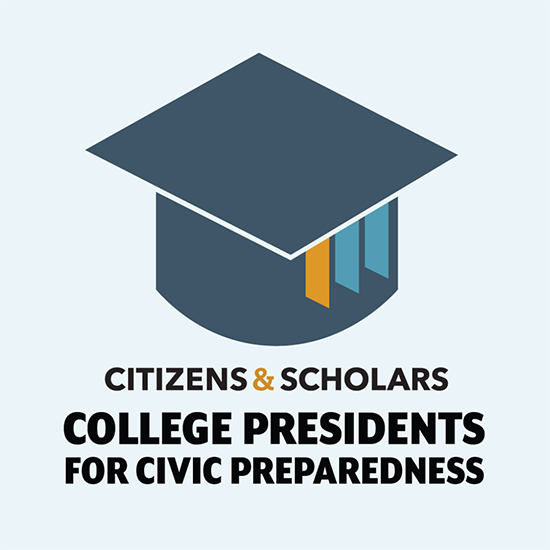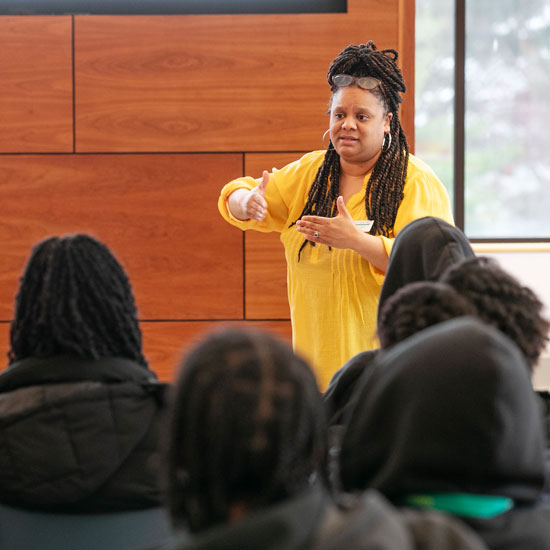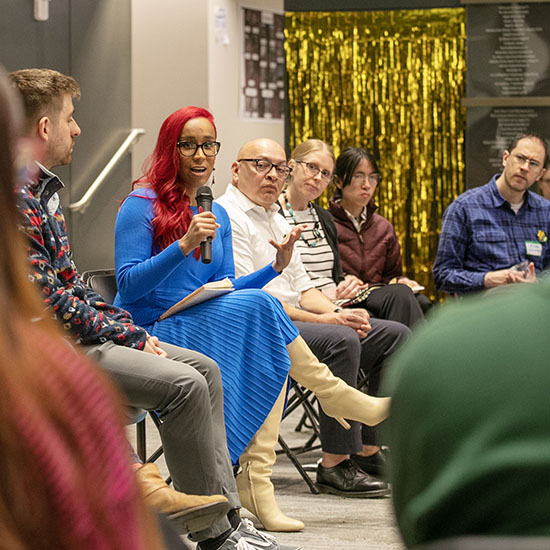Napkin Notes a distinctive approach to d-hall communication
You can spot them as soon as you enter Murray-Aikins Dining Hall. Some are terse scribbles; others are full of praise in flowery script. Some hang precariously from their thumbtacks, threatening to take off in a stiff breeze. Bold or artful lettering is often a distinguishing feature. These are the Napkin Notes, a direct line of communication between the d-hall staff and its customers. Initiated five years ago to give students a timely way to respond to food, programming, and other d-hall issues, the notes provide near-instant feedback.
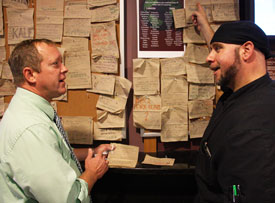
Dining Services Director Mark Miller (left) and Frank
Esposito, production manager, read and respond to
Napkin Notes. (All photos by Elizabeth Dean ’15)
According to Mark Miller, director of dining services, most colleges have a food committee and monthly meetings to deal with consumer issues; however, a Napkin Note allows a student to “write a note at breakfast and get an answer by lunch,” said Miller. “Our goal is to answer within 24 hours.” Miller does monitor the napkin board frequently. “If a student writes a Napkin Note, we can respond in two minutes. If I get asked at lunch, I can make it happen at dinner.” He has noticed that students will check the board the next time they visit the d-hall, to see if their notes have a response.
Most—but not all—of the notes focus on food. Earlier this fall one note simply said: “More Forks.” Explained Miller, “We have a problem with forks because students may borrow them for their rooms.” His napkin reply: “We just ordered forks and they should arrive soon.”
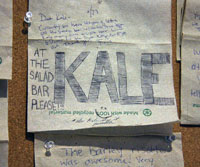
At least one Napkin Note led to a d-hall innovation. The note asked why there were no coat hangers in the dining hall. Rather than invest in coat racks, Miller’s response was to explore the installation of hooks on the booths along the perimeter of the hall. It was a relatively inexpensive solution that was quickly accomplished, and allowed students to keep their coats and backpacks near where they were seated. He responded to the note, “Great question. I hope you’ve noticed that we now have coat hooks on the booths.”
Students are not shy about requesting new food items. A recent request for soy milk and soy products led to increased soy milk varieties and local milk products being purchased. Miller said, “I get lots of good ideas from these notes. I have been on campuses when communication with students is not good. But here, if I am asked for ‘thinly sliced onions on the salad bar,’ yes, I can do that.” He continued, “Who knows what kids want? It’s all about communication. If you are a student and you want olives, I will try to find more olives for you.”
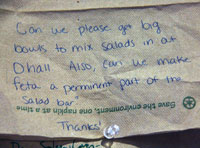
Often the requests focus on increasing the variety of the available food. Said Miller, “We empower our cooks to make decisions. We recently got a request for red wine vinegar. And we said, ‘Oh my god, it’s not out there?’ It turns out we had cider vinegar. So we added red wine vinegar to the salad bar.”
In response to a Napkin Note, the salad bar now regularly features four types of lettuce.
Miller characterizes the feedback as “90 percent positive, 10 percent negative.” Sometimes, the same food item will draw opposite opinions. Said Miller, “We got a note one day that said, ‘I don’t know what you did to the d-hall coffee, but it’s great.’ Three days later, a note said, ‘The d-hall coffee sucks.’”
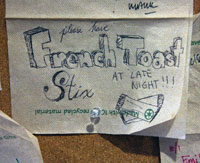
Diplomacy is the key in responding to the notes, said Miller. “I have to say no by saying yes,” he explained. For example, “We are sourcing a lot of sustainable fish now and are in the process of getting our Marine Stewardship Council Certification.”
Fish is popular in the dining hall, which featured red fish, cod, pollack, haddock, and shrimp this fall. Still, there was a Napkin Note requesting that salmon be served more frequently. When Miller responded, he indicated that the d-hall would continue to focus on product that is more easily sourced on the east coast, which helps to ensure freshness and is more cost effective.
Recently a face-to-face conversation centered on the question, “When will frosted flakes show up in the cereal bar?” Miller explained, “We’ve got 15 different types of cereal available daily. But that’s not how I replied. I indicated that we’ll have frosted flakes soon.”
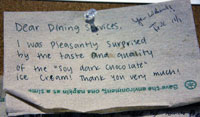
Sustainability is a theme of many questions. Said Miller, “I’m asked why we use paper bowls for the ice cream social. And I answer that when we run out of regular bowls we use recyclable material and compostable paper products. The campus Environmental Action Committee has asked about the cost and number of paper products (bowls, cups and plates) that we use. Eight-ounce paper cups – we use 750 a day, which costs us about $30. But if I pull paper cups, you’ll definitely see some Napkin Notes!”
He said that he works with Sustainable Skidmore to be as green as possible, by composting coffee grounds and offering zero-sort recycling. In addition, fryer oil is contributed to an effort that repurposes the product as diesel fuel.
A query about installing a refillable water-bottle station prompted Miller to check with Levi Rogers, sustainability coordinator. Since 2012 Rogers’s office has helped the College has install 17 water fountains that allow for refill of bottles, with an 18th scheduled to be installed in Penfield residence hall over the winter break. (Penfield won the Skidmore Unplugged competition and its prize is the installation of a refill station in the residence hall). As of Dec. 3, the fountains have saved the equivalent of 171,816 bottles from being used and discarded.
“My biggest thing is don’t waste food,” said Miller. “Taste it, but don’t waste it. That is where your money is going to waste—not on a case of paper cups.”
Although Miller tries to answer all Napkin Notes, some of them are just too zany, such as the recent request “Get the Jackson 5 to play here!” Miller wrote, “Dear Music Lover, Do you have a contact for the tour manager?”
Other entries from the Napkin Notes file:
“Taco Tuesday EVERY Tuesday. It is my favorite meal here.”
Judging from the line at the taco bar, this is a widely shared opinion.
“Korean Beef Tacos. (I miss these dearly.)”
“Mushroom on focaccia bread with tomato pesto = New FAVORITE food.”
Miller responded: “Great. We're glad you enjoyed it.”
“The noodles are always amazing! You guys are the BEST.”
Miller: “Thank you for your feedback. We appreciate it. Mark”
“I love DHall but please stop serving fried food every single day. This is not a fast-food restaurant.”
“Bring back the whipped cream”
“Fried Oreos”
“Onion Rings!! More Often”
